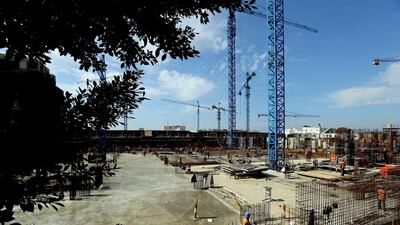Lebanon’s central bank might increase its US$1.5 billion stimulus package to help nudge growth that has sharply deteriorated because of political uncertainties in the country.
The stimulus, which was launched in 2013, extends loans to commercial banks at a 1 per cent interest rate to help boost growth that is forecast to reach 2 per cent this year.
“For this year we had a package of $1.5bn and only $600 million is left,” said Riad Salameh, the central bank governor, in a recent interview. “We might increase it. Our objective is to stimulate internal demand.”
He attributed the 2 per cent growth forecast to improvement in the construction sector and increased consumer spending.
“Economic activity in Lebanon is largely dependent on the confidence of consumers and households, and on the confidence of investors,” said Nassib Ghobril, the chief economist at Lebanon’s Byblos Bank. “The indicators so far point to a very modest growth in the first five months of the year, but the central bank’s stimulus package, an adequate summer season and end-of-year holidays season, along with generally stable security conditions, should support economic activity in the second half of the year.”
Growth in Lebanon between 2011 and last year has languished to about 2 per cent annually from more than 7 per cent between 2006 and 2010 because of a series of internal political upheavals and the influx of Syrian refugees, which is taking a toll on the economy.
Lebanon is grappling with an increasing number of Syrian refugees who now make up more than a fifth of the country’s population, and political instability sparked by an empty presidential position, postponed parliamentary elections and the lack of a national unity government.
Arabian Gulf countries, which have in the past provided financial support and a big number of tourists, have advised their citizens to refrain from travelling to Lebanon after a deterioration in ties between Beirut and Saudi Arabia, the broker of the 1989 Taif agreement that ended Lebanon’s 15-year civil war.
Tensions between the two countries came to a head when the Lebanese foreign minister did not condemn an attack on the Saudi embassy in Iran in January. The Lebanese stance prompted the kingdom to withdraw a $4bn aid package that it had pledged to bolster Lebanon’s security forces.
Mr Salameh said the Gulf travel ban had affected consumer demand in Lebanon.
“What we are missing here is demand in the consumer market that was due to the visit of citizens of the Gulf to Lebanon, and which is less now because of the ban. We hope this situation will get resolved.”
He emphasised that the Gulf-Lebanese strained relation has not had any effect on Lebanon’s key banking sector.
“The effect of the regional situation has been already absorbed, whether in the economy or the banking sector,” Mr Salameh said. “The growth in the banking sector is at levels that are sufficient to fund the private and the public sector.”
Deposit growth was at an annualised 5 per cent in the first five months of this year, a level similar to a year earlier, he said.
Credit growth is also up by 5.5 per cent in the first five months of this year.
“The banks are behaving well,” Mr Salameh said. “Their capitalisation is higher. Profitability is up, and has improved by 5 to 6 per cent this year.”
The central bank expects interest rates to stay unchanged this year and the Lebanese pound, which is pegged to the US dollar, to remain stable.
“Despite this economic slowdown and the related opportunity costs, the economy is not at risk of a collapse, as reflected by the stability of the Lebanese pound’s peg to the US dollar, the stability of public finances despite a wide fiscal deficit and a high public debt level, and especially because of the continued ability of the banking sector to finance the private and public sectors,” Mr Ghobril said.
Lebanon’s deficit is forecast to reach 8.1 per cent of GDP this year and next year because of higher outlays on current spending and debt servicing, Moody’s said in a report this month.
The ratings agency maintained Lebanon’s B2 credit rating with a negative outlook because of lack of action to reduce the fiscal deficit.
dalsaadi@thenational.ae
Follow The National's Business section on Twitter

